Gillette’s #MeToo ad opens door for healthy conversations

With over 17 million views, a new Gillette razor ad has taken on a life of its own starting conversations far deeper than an ordinary razor commercial. The ad specifically challenges men to take on toxic masculinity and many of the social woes that have long been ignored: bullying, sexual harassment, and the men who diminish women in the workplace. What has surprised me the most about the reaction to the ad is the amount of negative feedback it is getting. Feedback I believe is unwarranted. NPR covered the feedback in a story, “Backlash erupts after Gillette launches a new #MeToo – inspired ad campaign.” They describe most of the negative feedback as being rooted around the idea it paints men in a bad light, or as though it simplifies or stereotypes men. I didn’t get that at all from the ad. I would say every woman, but the truth is everybody, knows men or has seen men like those portrayed as toxic in the commercial. That doesn’t mean every man is bad. Quite the contrary, I believe, as I have written about before, boys/men are inherently good. That said, the ad has a strong message in calling for those still standing on the sidelines, as we as a nation address toxic masculinity, to get up and do something. It is time for each of us to play our part, men and women, to provide a safe environment for boys and men to accept responsibility for their own actions,, understanding sometimes they may be called upon to correct the behavior around them in a safe and appropriate setting. As the mother of two young boys, I will teach them to respect themselves, women, and one another while also allowing and encouraging them to be masculine. No, not all masculinity is toxic. Both myself, and the men in my sons lives, have and will encourage them to accept responsibility for themselves and to be a man and all that entails. Our society needs all types and that includes strong men. We cannot and should not discourage that. It takes strength to take on the a* holes, the bullies and the abusers. It takes strong individuals (men and women) to serve and protect in law enforcement and military. We need to draw the line between right and wrong not weak and strong when it comes to behavior. A sweet boy is no better than a strong/aggressive boy so long as that aggression is used in the right ways. The phrase “boys will be boys” is not dated boys do have natural tendencies that girls don’t always have. What we need to do is look at a particular behavior and correct it when it’s wrong. Wrestling isn’t inherently wrong. Fighting out of anger and aggression is. These are the nuanced differences this ad should have us discussing. So here’s to that. Here’s to talking and debating and discussing the things that matter the issues that shape our lives and ultimately our communities and the world. Here’s to raising and encouraging men to be the best they can be. If you oppose that message, you need to do some deep soul searching.
Daniel Sutter: Men, women, marriage and earnings

The #metoo movement has brought renewed focus on gender equity questions. Economics examines the pay gap between men and women, and a recent analysis from the Federal Reserve Bank of St. Louis links this gap to marriage, creating a puzzle for economics. The gender pay gap is large: among workers with at least a high school diploma between ages 45 to 54, men earn almost 50 percent more than women, roughly $75,000 versus $50,000 annually. Is this evidence of discrimination against women we could address through comparable worth pay legislation? Perhaps, but first let’s dig deeper into the issue. Labor economics explains wages and salaries based on productivity, or the extra output that a worker helps a business produce. Firms can afford to pay workers the value of this product and still make an adequate profit. Competition among firms to attract and retain good workers should drive salaries up to this level. If Alabama underpaid Nick Saban, other universities would happily compensate him fairly. Salary differences should then depend on differences in productivity. Economists would want to make more nuanced salary comparisons by gender in narrower job categories before concluding that women are paid less. Education and skills requirements differ way too much across jobs requiring a high school diploma to be conclusively informative. The St. Louis Fed analysis provides a different perspective: the gender pay gap is really a gap between married men and everyone else. Single men, single women, and married women all make around $50,000 in the prime earning years of 45 to 54; married men make almost $90,000. Interestingly, no pay gap seems to exist between single men and single women. Can we make sense of this? First off, marriage may not necessarily make men more productive. Men who are more productive – that is, have more education, training, and drive to succeed – may be more likely to be married. We need not believe that reciting the marriage vows increases men’s (but not women’s) productivity. Marriage could also make men focus seriously on work and a career. We might recognize that at some point we became much more serious about work; for me, this occurred in grad school. Marriage may have this impact on many men. Seriousness and focus could explain higher earnings, and since economists can’t easily measure a person’s seriousness directly, in the data this will look like a marriage effect. There’s another possible explanation. In many workplaces, bosses have discretion over giving out raises, and an employee might have to ask for a raise. Suppose married and single male employees both ask for raises. The boss might believe that the married man “needs” the raise more – to pay for his kids’ braces, or to help take care of his in-laws. While plausible, salaries based on need violate the labor economics theory. And it undermines a potential argument against comparable worth pay legislation to narrow the gender pay gap. The argument maintains that businesses must be given the freedom to pay employees based on productivity. But if compensation based on perceived need does not ruin our economy, then raises for women surely won’t cause an economic train wreck. All the above factors likely contribute to married men’s higher earnings. Businesses can deviate at least some from productivity in setting wages and salaries without going bankrupt. The greater consequence of comparable worth legislation is shifting salary determination ultimately from businesses to bureaucrats. In the long run as politics determines more salaries across the economy, economic performance may decline significantly. Labor economics seeks to explain salaries across different jobs, but productivity theory is also gender (and color) blind. Although women may indeed not be paid according to their productivity by every employer, competition should prevent pay from getting too far out of line with productivity. Hopefully bosses will reward underpaid women employees, because #metoo has sadly shown that politicians are not always gender blind. ••• Daniel Sutter is the Charles G. Koch Professor of Economics with the Manuel H. Johnson Center for Political Economy at Troy University and host of Econversations on TrojanVision. The opinions expressed in this column are the author’s and do not necessarily reflect the views of Troy University.
‘A scary time’: Donald Trump taps fears of #Metoo run amok

Men of America, be afraid. This could happen to you. That’s the alarm President Donald Trump and his GOP allies are increasingly sounding as they try to defend their Supreme Court nominee from sexual assault allegations. The three-decade-old accusation facing Brett Kavanaugh is not only false, they argue, but an example of the #MeToo movement gone too far in its call to believe the women — and not the men. It’s a message that looks to channel the frustration and anxieties of the party’s bedrock voters — white men — just weeks before an election. This is “a scary time,” Trump said Tuesday. “It’s a very scary time for young men in America when you can be guilty of something that you may not be guilty of. You can be somebody that was perfect your entire life and somebody could accuse you of something … and you’re automatically guilty.” At a campaign rally later in Mississippi, Trump pretended to be a son asking his mother how to respond to such an accusation. “It’s a damn sad situation,” Trump said. Trump also mocked one of Kavanaugh’s accusers, Christine Blasey Ford, for her Senate testimony last week. He imitated Ford responding “I don’t know” and “I don’t remember” to questions about her claim that Kavanaugh sexually assaulted her more than 30 years ago. “And a man’s life is in tatters,” Trump said. Trump’s comments came as Republicans stare down a challenging midterm election and need to motivate their most reliable voters. All signs suggest Democratic women are energized by opposition to Trump’s presidency. The primary season yielded record numbers of female candidates. Kavanaugh’s confirmation battle and the national soul-searching over sexual consent it has provoked threaten only to further motivate liberal female voters, leaving Republicans searching for a counterweight. In his warning, Trump echoed some of his allies. Rep. Steve King of Iowa said “if Kavanaugh is not confirmed, every man is subject to seeing their life’s work and their reputation destroyed by an unsubstantiated allegation.” Sen. John Kennedy of Louisiana declared: “This is no country for creepy old men. Or young men. Or middle-aged men. But this is no country at all.” And Trump’s oldest son, Donald Trump Jr., told the Daily Mail this week: “I’ve got boys, and I’ve got girls. And when I see what’s going on right now, it’s scary,” adding that right now he fears more for his sons. The rising frustration came as the Kavanaugh confirmation process played out before the country, with Kavanaugh and Ford appearing before the Senate Judiciary Committee last week to discuss her accusation. Kavanaugh’s confirmation continues to hang in the balance as the FBI investigates the allegation, which Kavanaugh has forcefully denied. With the midterm elections just weeks away, Republicans risk losing the House and possibly the Senate as they face an energized Democratic party — particularly educated, suburban women and minorities — and a wave of GOP retirements, as well as the president’s sagging approval ratings and the tide of controversy around his White House. Trump’s GOP badly needs to motivate men, especially the white, working-class men who fueled the president’s political rise, experts say. Trump’s electoral strategy has long revolved around the argument that men “are somehow victims or they’re losing out to other people or they’re unfairly persecuted in an age of political correctness,” said Julian Zelizer, a political historian at Princeton University. The November elections are “all about turnout, enthusiasm and motivation,” which Democrats have shown they have. “The question is: How can Trump or the Republicans counterbalance that? And this is the way that can do that,” Zelizer said. “It’s another way to shore up his base.” Indeed, a Quinnipiac University poll released Monday found a gaping gender gap when it comes to support for Kavanaugh’s nomination. The poll found 55 percent of women do not believe the Senate should confirm him, versus just 40 percent of men. And 52 percent of men believe Kavanagh has been treated unfairly, versus just 43 percent of women. “The disparity is stunning,” said Jim Malloy, assistant director of the Quinnipiac University Poll. “You usually don’t see this kind of divide between men and women on seminal, important issues.” Polls show Republicans are more likely to be skeptical of the #MeToo movement, which has spurred women to come forward with their stories of sexual assault and harassment, and to believe it has gone too far. Republicans argue the Kavanaugh debate will drive enthusiasm among men and women. Barry Bennett, a former senior Trump campaign adviser, accused Democrats of “hijacking the #MeToo movement,” and argued the way Kavanaugh has been treated is driving Republican enthusiasm with men and women. “The one thing we’re seeing across is the country is (Republicans) are really energized. They’ve been woken up because of what’s happening to Brett,” he said. “If we play this smart, there maybe will not be a blue wave.” Indeed, the Republican National Committee said it has seen a surge in donations over the last week, with Sunday marking the committee’s largest online fundraising day ever, according to an RNC official. The person, who spoke on condition of anonymity because the person wasn’t authorized to publicly reveal the figures, also said the party had logged 1,000 new small-dollar donors that day who had never previously given to the committee. But Democratic strategist Jim Manley questioned the strategy. “I think they’re playing a dangerous game with this overt play to generate enthusiasm from their white, male base. As far as I can tell they already have those folks,” he said. “My bet is that this will just make Trump and the Republican Party even more radioactive with women voters.” Republished with permission from the Associated Press.
1 hearing, 2 witnesses, vastly different takeaways
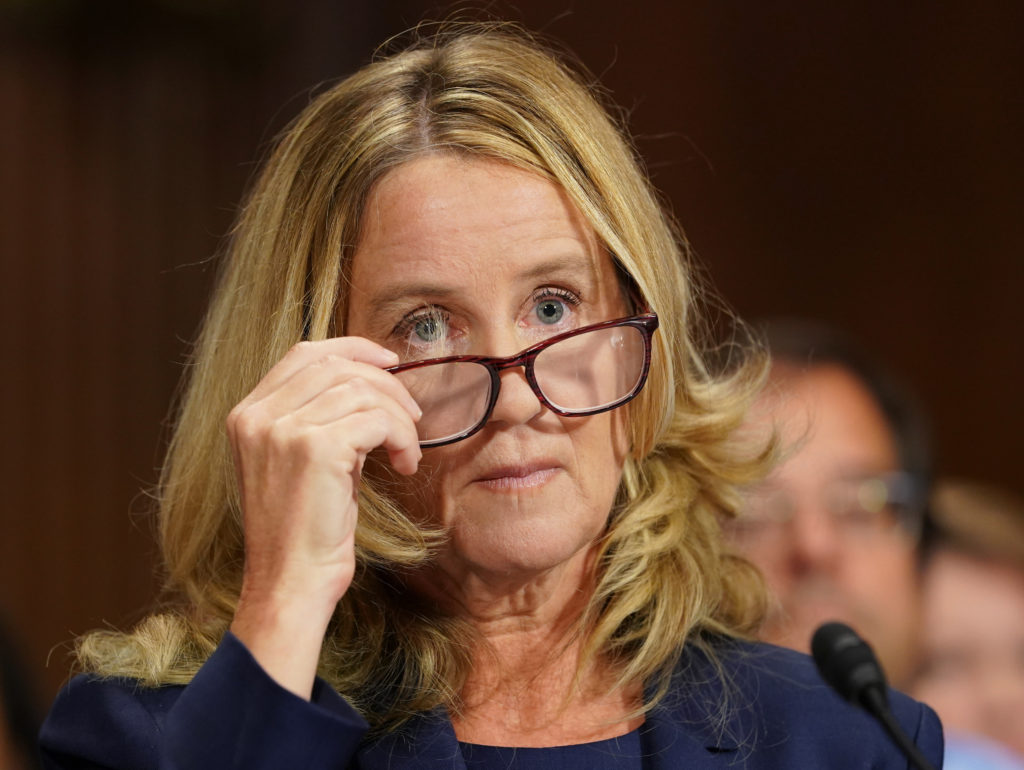
It was one hearing, with just two witnesses. But, in an era of political polarization and yawning cultural divides, Americans came away having heard very different things. Millions of men and women listened to nervous-but-composed college professor Christine Blasey Ford tell the Senate Judiciary Committee on Thursday that she was “100 percent” certain that Supreme Court nominee Brett Kavanaugh sexually assaulted her when they were teenagers, and they lauded her credibility and courage in speaking out. Others saw a woman with a spotty memory who failed to prove Kavanaugh was her abuser, and believed the judge as he repeatedly choked up and vigorously defended himself. “The allegation of misconduct is completely inconsistent with the rest of my life,” he said. Americans followed the hours of testimony from their homes, in their cars, in offices and in classrooms. Wherever they were, though, it seemed most responded through the prism of their own politics, and personal experiences. Few people interviewed by The Associated Press seemed to have had their minds changed by anything they heard. Heather Lake of Omaha, a stay-at-home mother of four and registered Democrat, said she went into the hearings believing Ford, and that the professor’s testimony only solidified her belief. “Just seeing how vulnerable she is, it strikes me how cruel all the attacks on her have been,” said Lake, 38, who was sexually assaulted in her teens. “This is why women keep their sexual assaults to themselves.” But Connie Cook Saunders, a 52-year-old fitness director for a San Diego athletic club who considers herself a moderate Republican, wasn’t swayed by Ford’s appearance. “I personally feel like it’s a witch hunt,” she said. “It’s political. If it happened to her I am sorry, but it doesn’t make sense to bring it up now.” The hearing was to be the culmination of a Supreme Court nomination process that will determine the political bent of the court for decades, and quite likely decide issues such as the legality of abortion and gay marriage in the United States. It took place in a week when “America’s Dad,” Bill Cosby, was declared a sexual predator and sentenced to jail, and at a time when the U.S. president himself has battled multiple accusations of sexual misconduct. The major backdrop was the #MeToo movement, in which women across the country have brought down powerful men they accused of sexually assaulting or harassing them. Ford’s detailed testimony brought many to tears in the wood-paneled hearing room and beyond as she described being locked in a bedroom as a 15-year-old by two drunk boys whom she identified as Kavanaugh and his friend Mark Judge. She said Kavanaugh groped her, tried to take off her clothes and covered her mouth to keep her from screaming. “Both Brett and Mark were drunkenly laughing during the attack,” she said, adding that she eventually escaped to a bathroom. In fact, she said, her most indelible memory was the “uproarious laughter,” the two boys “having fun at my expense.” She was “terrified” to testify, she said, but did so because “I believe it is my civic duty to tell you what happened to me while Brett Kavanaugh and I were in high school.” Kavanaugh began his own testimony on a note of barely contained fury. He labeled Ford’s accusation and two other allegations that have followed as “smears,” ”character assassination” and part of a “calculated and orchestrated political hit” fueled by a hatred of President Donald Trump and funded by left-wing opposition groups. He repeatedly fought to control his tears as he talked about how the allegation has destroyed his family. “The truth is that I have never sexually assaulted anyone — not in high school, not in college, not ever,” he said. His supporters focused on what Ford could not remember. How is it possible, they wondered, that she didn’t recall the exact address where the assault took place or how she got to and from the house? Mary Ann Almeida, who said she was raped as a 14-year-old, thought Ford came across as untruthful. “When you’re a true victim, you remember where it happened,” said Almeida, now 60, who watched the hearing from her home in southeastern Kentucky. “You know who was in the room, you also remember every single detail.” But it was Kavanaugh whom Jalon Alexander, a 25-year-old Democrat and law student at the University of Pittsburgh, did not find credible. “The more I listened to him, there was nothing he said that made me doubt Dr. Ford’s accusation,” Alexander said. “What makes him so special that we’re willing to undermine the integrity and legitimacy of the court?” In San Diego, Republican strategist Jennifer Jacobs was struck by Ford’s sincerity. But she also was moved by Kavanaugh. “Clearly this is a passionate man,” she said. “He’s not some crazed barbarian.” She added her “heart was breaking” for his wife and children. But Jen Bradshaw in Quincy, Illinois, who was texting with a girlfriend as they watched Kavanaugh’s opening statement, was shocked at his angry demeanor. “Can you imagine if Dr. Ford had shown even a hint of that much anger or openly cried?” said the 36-year-old mother of two. She also wondered: “If this is him sober and angry, what is he like after one too many beers?” At Yale, Kavanaugh’s alma mater, student Samantha Peltz was troubled by what she called the partisan nature of the judge’s remarks. “It’s quite surprising to see him behave in such a partisan manner as someone being considered to be elevated to the highest court in the land,” she said. Another viewer, sympathetic to Kavanaugh, saw the hearing as an attack on a successful white man. “He’s on trial for being basically a white conservative who went to an elite school,” said Mike Glasoe of West Fargo, North Dakota, who considers himself independent politically and said he has voted for both Democrats and Republicans. But in Raleigh, North Carolina, artist and retired state employee Penney De Pas called it
GOP warns time running out for Brett Kavanaugh’s accuser to talk
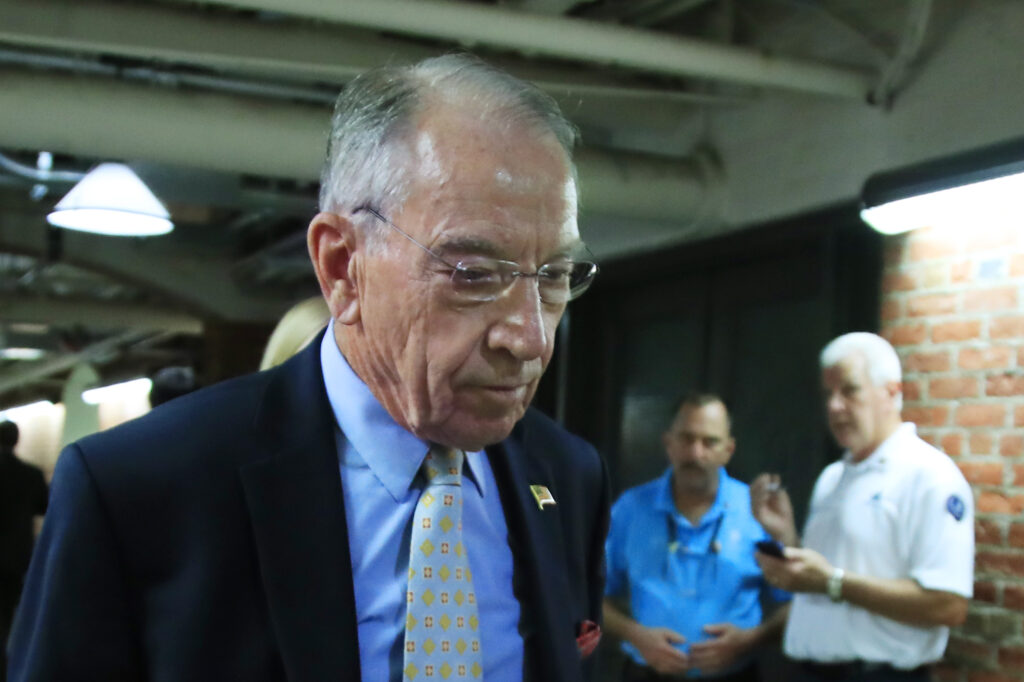
Republicans are warning that time is running out for Brett Kavanaugh‘s accuser to tell Congress about her claim he sexually assaulted her when both were teenagers, even as President Donald Trump called the woman’s allegation hard to believe in one of the GOP’s sharpest attacks on her credibility. With Kavanaugh’s Supreme Court nomination dangling in the balance, the chairman of the Senate Judiciary Committee said his panel still planned a Monday morning hearing that Kavanaugh and Christine Blasey Ford were invited to attend. Sen. Chuck Grassley, R-Iowa, wrote Ford’s attorneys Wednesday that the panel was giving the California psychology professor until 10 a.m. Friday to submit a biography and a prepared statement “if she intends to testify” Monday. It remained unclear, though, whether Ford would attend or if the hearing would occur without her as a drama that has riveted Washington since emerging a week ago was injected with a fresh burst of election season suspense. After initially saying through a lawyer Monday that she was willing to appear, Ford has since said she first wants a full FBI investigation of her accusation. Trump and Senate Republicans have been emphatic that an FBI renewal of its background checks on Kavanaugh won’t happen, saying an investigation by committee staff — which Democrats are boycotting — is sufficient. Ford’s demand has been fully backed by Democrats. Lisa Banks, a Ford attorney, wrote that Grassley’s plan to call just two witnesses, Kavanaugh and Ford, “is not a fair or good faith investigation” and said “multiple witnesses” she did not name should be included. “The rush to a hearing is unnecessary, and contrary to the Committee discovering the truth,” Banks wrote. The standoff left both parties gambling over which of their approaches would appeal to voters in November’s elections, which will determine House and Senate control. Republican leaders trying to keep GOP senators behind Kavanaugh are offering Ford a chance to describe her allegation, either in a hearing room before television cameras or in private. Republicans have largely stood by Kavanaugh’s denials. Democrats are casting Republicans as strong-arming a wronged woman, their eyes on a #MeToo movement that has caught fire and exploded the careers of dozens of male titans. “Republicans are trying to bully her into a rigged hearing,” No. 2 Senate Democratic leader Dick Durbin of Illinois tweeted about Ford. Trump told reporters, “I can only say this: He is such an outstanding man. Very hard for me to imagine that anything happened.” That remark was noteworthy because most Republicans have handled the question of Ford’s credibility more gingerly. They say they want to give Ford, now a professor at Palo Alto University, every chance to tell her story. Ford has contended that at a house party in the 1980s, a drunken Kavanaugh tried undressing her and stifling her cries on a bed before she fled. Republicans are resisting all Democratic efforts to slow and perhaps block what once seemed a smooth path to confirmation that would promote the conservative appeals court judge by the Oct. 1 opening of the Supreme Court’s new term. A substantial delay could push confirmation past the November elections, when Democrats have a shot at winning Senate control, plus allow more time for unforeseen problems to pop up. There were signs the GOP’s strategy of planning a nationally televised hearing yet also offering Ford the option to testify privately was keeping possible Republican defections in check. The party controls the Senate 51-49 and the Judiciary panel by 11-10, so it cannot afford GOP “no” votes. Moderate GOP Sen. Susan Collins of Maine, who’s had her share of clashes with Trump, said she hoped Ford would reconsider a decision not to testify and “it’s not fair to Judge Kavanaugh” if she refuses. “Otherwise, there are these very serious allegations hanging over the head of a nominee who has emphatically denied them,” she said on radio WVOM in Bangor. Going further, Sen. Lindsey Graham, R-S.C., said Democrats’ demands for an FBI investigation were a ploy to delay a confirmation vote. “It is imperative the Judiciary Committee move forward on the Kavanaugh nomination and a committee vote be taken as soon as possible,” the committee member said in a statement. As for a possible FBI intervention, Grassley said in his letter to Ford’s lawyers, “We have no power to commandeer an Executive Branch agency into conducting our due diligence.” In a separate letter to Democrats, Grassley wrote that committee aides were “even willing to fly to California, or anywhere else, to meet her.” He also wrote that GOP aides tried to arrange interviews with two other “alleged witnesses.” The letter mentioned no names and committee staff declined to identify them. Kavanaugh did not return to the White House Wednesday after spending the two previous days there. He spoke by phone with officials working on strategy, said an aide familiar with the proceedings but not authorized to speak publicly about private conversations. Kavanaugh spent hours Tuesday in the Eisenhower Executive Office Building, part of the White House complex. He prepared for Monday’s potential hearing with officials including White House counsel Don McGahn, Justice Department aides, White House press secretary Sarah Huckabee Sanders and communications director Bill Shine. Shine was ousted from his previous job at Fox News in part due to his handling of sexual harassment claims at the company. Republished with permission from the Associated Press.
Oprah Winfrey-backed ‘Rape of Recy Taylor’ recounts woman’s ordeal
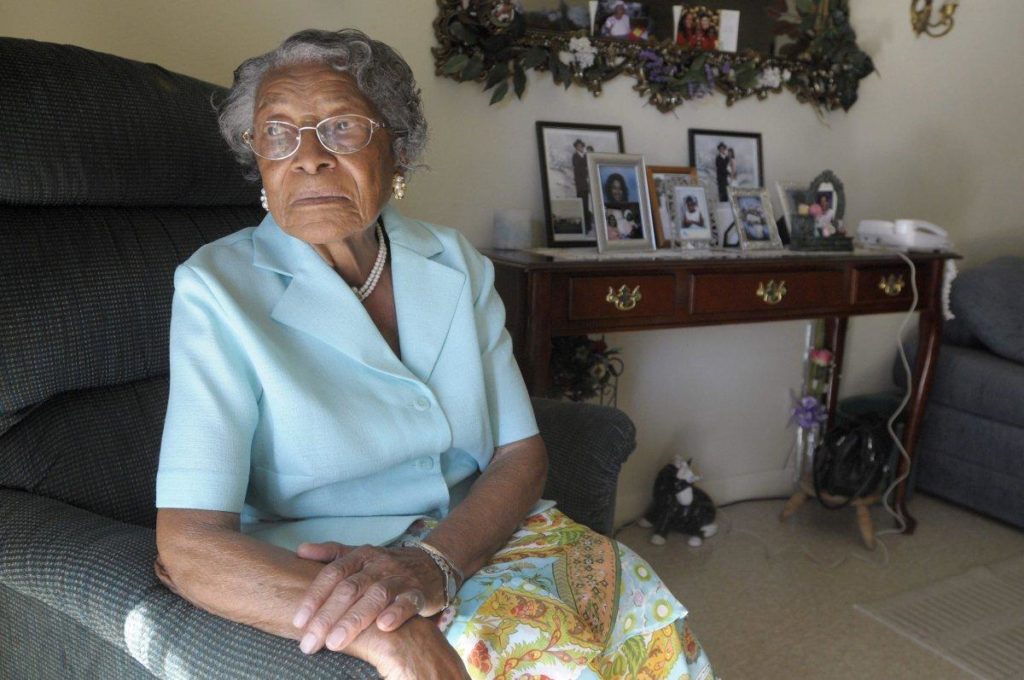
When Oprah Winfrey saluted unheralded #MeToo crusaders at the Golden Globes last January, she chose a rape victim from 1940s Alabama to drive home her point. “Recy Taylor, a name I know, and I think you should know, too,” Winfrey said, sketching the outlines of the African-American woman’s assault by six white Alabama youths and her quest for justice. Taylor’s wrenching story and its connection to female civil rights activists, most notably Rosa Parks, are illuminated in filmmaker Nancy Buirski’s documentary “The Rape of Recy Taylor” (airing 9 p.m. EDT Monday on the Starz channel). Taylor, who died last December at age 97 shortly after the film’s theatrical release, is seen and heard briefly in it. Her words are powerful despite her frailty. “I can’t but tell the truth of what they done to me,” she said, condemning both her attackers and the authorities who weren’t “concerned about what happened to me.” The film mixes orthodox documentary elements — accounts from Taylor’s relatives and other contemporaries, the perspectives of historians — with haunting visual touches and music such as Fannie Lou Hamer’s “Go Tell It on the Mountain.” It blends into somber, unsettling poetry. There are clips from so-called “race films,” vintage movies made by African-American moviemakers, including one in which a distraught woman flees from unseen danger. In a scene from Oscar Micheaux’s “Within Our Gates” (1920), a white man attacks a black woman. The movie excerpts help “communicate very quickly that this didn’t just happen to Recy Taylor” and help broaden one woman’s ordeal to a “much larger canvas” about the peril black women faced, filmmaker Buirski said. In 1944, Taylor, then 24, married and a mother, was walking to her Abbeville, Alabama, home after an evening church service with two friends, an older woman and her 18-year-old son. Local whites out joyriding stopped them and, at gunpoint, demanded Taylor get in their car. They raped her repeatedly and, after forcing money into her hand, released her after she agreed to remain silent. She stumbled home “crying and upset,” recalls her brother, Robert Corbitt. “Those young boys felt like they can do it and get away with it. They really felt like they could. They know nothing was going to happen to them.” But Taylor fought back, recounting the assault to the local sheriff. Her courage put her family at risk — their home was firebombed — and eventually led to two faint-hearted, failed efforts to bring the case to trial in the Jim Crow South. The roots of such inaction run deep. Yale associate professor Crystal N. Feimster, who is part of the documentary, has written that it was a legal impossibility for a female slave to file rape charges against a white man in any Southern state before 1861. Northern black newspapers doggedly covered Taylor’s case as it unfolded, prompting African-American protests and action by the NAACP. The civil rights group dispatched Parks, then the secretary in its Montgomery, Alabama, office, to meet with Taylor — before Parks gained fame as the woman whose refusal to move to the back of a segregated bus sparked a powerful boycott. In a newspaper photo taken at the time, Taylor stares directly at the camera with an expression both stolid and determined. It’s a portrait of a young woman prepared to stand her ground. At one point, the Abbeville sheriff dismissed Taylor as “nothing but a whore” whom he’d arrested before, then admitted she had never been jailed and that she and her family were of good reputation. Filmmaker Buirski, who recounted the groundbreaking interracial marriage of Richard and Mildred Loving in a documentary and was a producer on the big-screen drama “Loving,” learned of Taylor from historian Danielle L. McGuire’s 2010 book, “At the Dark End of the Street: Black Women, Rape, and Resistance.” “One of the things that I felt so strongly about in this film (and the ‘Loving’ documentary) is you have people who have the moral courage to stand up, and they change history as a result,” Buirski said. “They don’t have to be activists. Anybody can change history.” There’s a question she’s fielded before, about why a white New Yorker felt compelled to make a film about Taylor, and she has a ready answer. “I do feel that whites and blacks should be telling stories about each other. I think that whites in particular have a responsibility to deal with this information because whites really are the reason for the suffering that a lot of blacks had,” she said. Was she the right person to make the documentary? “I’m the first person to say I don’t know what it’s like to be in a black woman’s skin,” one who would recount Taylor’s life and times differently and maybe better, Buirski said. But, she added, it’s up to African-American filmmakers to make “The Rape of Recy Taylor” the first “in a volley of stories” about her, not the last. Republished with permission from the Associated Press.
Birmingham-based national women’s group takes on Microsoft, big tech

With Gov. Kay Ivey at the helm, Alabama has been hard at work luring new businesses to the state like ants to a picnic. It seems like every time you turn around, another big business it’s announcing its arrival or expansion in the Yellowhammer State. Just this week, Ivey on Thursday announced Facebook will invest $750 million to build a data center in Huntsville, creating 100 high-paying jobs. In April, Google broke ground on a new $600 million data center in Jackson County, Ala. It is expected to add upwards of 100 well-paying jobs with highly technical skill sets, including computer technicians, system administrators, software technicians and engineers. But one Birmingham-based national women’s is questioning at what price tech jobs, like these, are coming to the state. Women United — a group that describes itself as a next phase of the #MeToo movement, dedicated to defending all women by shining a light on men who take advantage of women, thinking they can hide or are above the law — is calling out the tech industry and companies like Microsoft for its long history of sexual harassment and discrimination challenges in the workplace in hopes of protecting Alabama women. “With the growth of tech companies has come a painful reality that women in the field face sexual harassment and discrimination challenges other industries have long since put behind them,” wrote the visionary behind Women United, Catrena Norris Carter in an AL.com op-ed. The 30-year veteran of both the civil rights and women’s movements in America isn’t accepting the news of new tech jobs without holding the industry accountable. The numbers don’t lie Sexual harassment runs rampant in the tech industry. Seventy-eight percent of women founders say they have been harassed or know someone who was, according to First Round Capital’s annual State of Startups survey. Discrimination is an issue as well. According to CNN tech, “89% of those making investment decisions at the top 72 firms are male, according to one survey. And in 2016, VCs put $64.9 billion into male-founded startups, compared to $1.5 billion into female-founded startups, according to new data from PitchBook.” And it’s not just taking place at startups. According to a filing, Women at Microsoft filed 238 complaints with the company’s HR department between 2010 and 2016, including 108 complaints about sexual harassment and 119 about gender discrimination. There were also eight complaints of retaliation and three about pregnancy discrimination, the filing said. The tech giant is currently in the midst of a court battle over these allegations. Looking for accountability Women United it looking to protect Alabama women from being added to the shocking statistics of sexual harassment and discrimination. “As our state–and, more specifically, our big cities, including Birmingham, Huntsville and Mobile–looks to attract and grow tech firms, we must demand accountability regarding discrimination and sexual harassment,” Carter continued. “When lawmakers are cutting deals, they must ask those companies what they are doing to foster a safer and healthier environment for women.” “We don’t need that culture in Alabama–no matter how many jobs and tax dollars it brings,” Carter concluded.
Some Alabama women feel left behind by the #MeToo movement
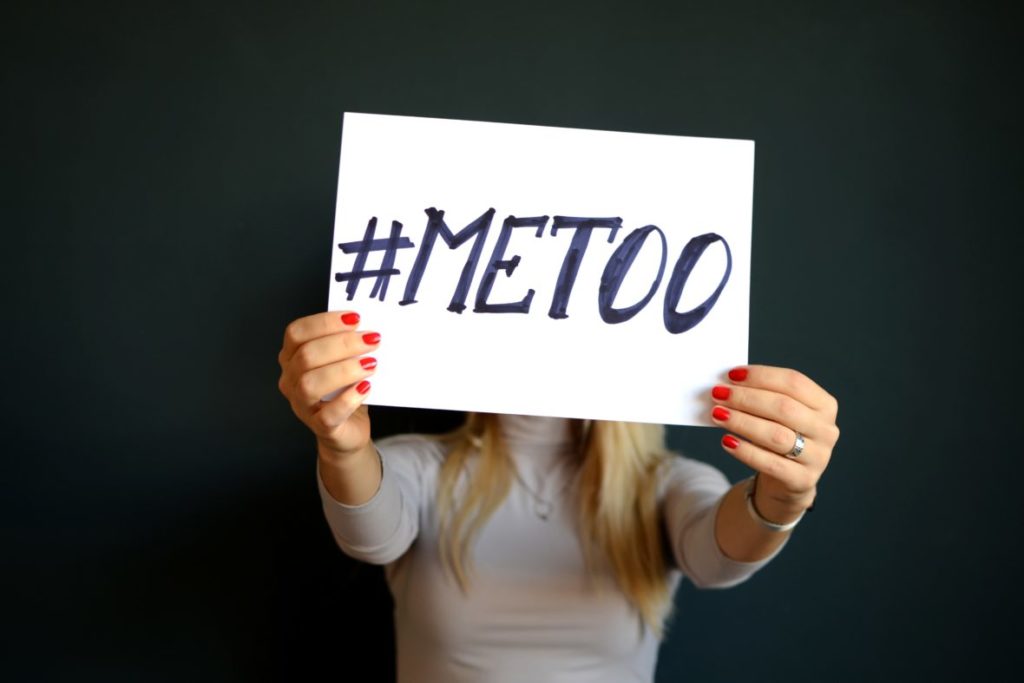
Some women in Alabama have a hard time identifying with #MeToo, a movement they feel often doesn’t leave space for conservative women’s voices. Elizabeth Sheth of Huntsville is one of two women engineers in her office, a mother of three and a conservative Christian. She thinks the #MeToo movement is important, but believes it sometimes goes too far, shaming all men. Sheth said the movement does not give women enough credit when it comes to personal responsibility. “(The movement) should also include what women can do (to prevent assault),” Sheth said, but stopped herself. “You can’t say that without victim shaming.” Sheth said she supports women’s efforts to speak out, but finds #MeToo hard to talk about without getting shamed for bringing up a woman’s responsibility to defend themselves before raising a red flag to the media. Nancy K, who asked AL.com not to use her last name because of employment concerns, is a small business owner and conservative Christian in Mobile. She said it’s hard to get behind #MeToo and women’s rights movements when some women who have the floor use vulgar language and imagery. She said it’s important to speak out against physical sexual assault, but that verbal abuse should not be lumped into the #MeToo movement. Nancy’s Christian upbringing affects how she reacts to women who encounter sexual harassment. “As a Christian, God closes one door and opens another. If I’m being harassed then he has another plan for me, and I have to go on faith and move in that direction,” Nancy said. “But I understand not all women believe that.” A #MeToo leader in Alabama Tina Johnson who spoke out against Roy Moore for allegedly assaulting her in 1991, along with the other women, became Alabama’s unofficial #MeToo rallying cry. Johnson said she grew up in a conservative, Bible-believing household. She was taught to “hear no evil, see no evil” when it came to sexual misconduct. Discussing sexual behavior was “not an appropriate conversation.” Growing up, she was encouraged by her church and family to hold men in high regard, and to “submit” to the men in her life. After Johnson spoke out, she was chastised in her community. Two months later, her house was destroyed by fire. Last month, Moore sued her and two of the other accusers, alleging they were part of a political conspiracy. “People want to know why we don’t speak up, but I’m going to tell you I am living proof,” Johnson said. “I have been through hell and back.” Despite multiple women speaking publicly about alleged sexual assault at the hands of Moore, 68 percent of white women voted for him in the Senate election against Doug Jones. Eighty percent of white evangelicals voted for Moore. “The cost of believing (the women) was so politically high, many on the right refused to admit what was right in front of them,” Dana McCain, a conservative faith and politics columnist said. “It was a sort of intellectual dishonesty that kept us from doing what we needed to do.” McCain said voters on both ends of the spectrum often turn a blind eye to what doesn’t fit into either parties’ narrative, or “inconvenient truths.” “We categorize certain movements or ideas based on who is involved. We have to judge ideas on their merits,” McCain said. Brushed aside but not giving up Lauren Peabody, a Tuscaloosa mom of two, found solidarity when women around the world began to speak out about their experiences with sexual assault and sexual harassment. Her own stories of abuse in the workplace were brushed aside my management and human resources when they happened, but the #MeToo movement gave her space to speak up again. At Peabody’s first job in college, developing film, she spoke up when a man she worked with began making copies of photos of women to take home. Her boss rebuked her concern, and Peabody was fired. At 25, she was sexually harassed on multiple occasions by her store manager at a corporate pawn shop. She asked for direction from her human resources department, but after an investigation, they claimed she had “warranted the attention.” “I was recently a single mom. I have to stay (at that job). I have to pay my bills. I can’t leave,” Peabody said. “I took a leave of absence and he harassed me until the very last day of my employment.” Today, Peabody works for two women-owned companies, a conscious decision she made in an effort to avoid sexual harassment in the workplace. “Alabama’s belief system is based on the Bible, whether we’re Christian or not,” she said. “We look up to men of power; congressmen, police officers, pastors. They have this moral code and they fit that idol that we made them out to be.” Peabody said she doesn’t think anything has changed since the #MeToo movement touched Alabama after Roy Moore’s defeat by Jones in December 2017. But Johnson said the cause is worth it for Alabama women to continue speaking out against sexual abuse and sexual harassment. “Just don’t give up. It’s worth the fight,” Johnson said. Republished with the permission of the Associated Press.
Allegations from women in his past shadow Donald Trump

The chorus of women from President Donald Trump’s past is getting louder. Accusations about Trump’s past sexual exploits bubbled up on three fronts Tuesday, with two women pressing court cases and a porn actress publicly needling the president. Trump has so far weathered the rising #MeToo movement, but the latest developments served as a fresh reminder about the shadow thrown by questions about the thrice-married businessman’s past. In short order on Tuesday: —A former Playboy model who claims she had an affair with Trump in 2006 filed a lawsuit in California seeking to invalidate a confidentiality agreement so she can discuss her alleged relationship. —A New York City judge ruled that a defamation lawsuit by a former contestant on “The Apprentice” can move forward while Trump is in office. She has accused Trump of unwanted sexual contact. —Porn actress Stormy Daniels and her lawyer continued their media campaign against Trump as she seeks to invalidate a nondisclosure agreement she signed days before the 2016 presidential election so she can discuss their relationship. “People DO care that he lied about it, had me bullied, broke laws to cover it up, etc.,” Daniels tweeted. Trump has consistently denied accusations from all three women. He has previously called his accusers “liars” and has deemed such reports “made up stuff.” But it was another distraction for a White House already contending with a rash of high-level departures and a stalled legislative agenda. But the women aren’t going away. The former Playboy model, Karen McDougal, is set to do an interview with Anderson Cooper on CNN Thursday. And Daniels — whose legal name is Stephanie Clifford — has taped an interview with CBS’ “60 Minutes,” expected to air soon. McDougal’s attorney appeared on NBC on Wednesday morning. “Karen McDougal had a sexual relationship with Donald Trump for 10 months,” said Peter Stris. “It was a romantic relationship. They were together very often.” Some longtime allies questioned whether the accusations would have much impact. More than a dozen women came forward during the 2016 campaign to say that Trump had harassed them or worse, many speaking out in the wake of the “Access Hollywood” tape in which he was heard bragging about groping women. Some of them spoke out again as the #MeToo movement took off. “I think we learned through the campaign something we never thought was true. People were able to bifurcate the person from the policies,” said former campaign adviser Barry Bennett. “They were willing to overlook the personal behavior or the words on tape.” In the case of the Playboy model, Karen McDougal filed suit Tuesday in Los Angeles County Superior Court against American Media Inc., the company that owns the supermarket tabloid National Enquirer. It had paid her $150,000 during the 2016 presidential election. The lawsuit alleges that McDougal was paid for the rights to her story of an affair, but the story never ran. It also alleges that Trump’s attorney, Michael Cohen, was secretly involved in her discussions with American Media. McDougal’s lawsuit was filed on the same day a New York judge sided with Summer Zervos, a 2006 “Apprentice” contestant. She sued Trump after he dismissed as “fabricated” and “made-up” her claims of misconduct at a hotel in Beverly Hills, California, in 2007. Her lawsuit sought an apology and at least $2,914. In saying the suit can go forward, Judge Jennifer Schecter wrote, “No one is above the law.” Trump’s lawyers had argued the Constitution immunized him from being sued in state court while he’s president and had said the case should at least be delayed until he’s out of office. They said their position was supported by a long line of Supreme Court cases requiring courts to show deference to the president and his schedule. In 1997, the Supreme Court ruled that a sitting president was not immune from civil litigation on something that happened before taking office and was unrelated to the office. The ruling came after Paula Jones filed a sexual harassment lawsuit against President Bill Clinton. That case was dismissed by a judge, but was appealed. The appeal was still pending when Clinton agreed to pay $850,000 to Jones to settle the case. He did not admit wrongdoing. Also Tuesday, an attorney for Daniels — her real name is Stephanie Clifford — tweeted what he described as a 2011 photo of Clifford taking a lie detector test during which she addressed her relationship with Trump. Lawyer Michael Avenatti added the hash tags #searchforthetruth, #whosenext? and #buckle-up. Daniels and McDougal have offered strikingly similar stories about their alleged relationships with Trump. Both women claim to have had sexual encounters with him in Lake Tahoe, Nevada, in 2006. McDougal, who was the 1998 Playboy Playmate of the Year, said Trump also brought her to his private bungalow at the Beverly Hills Hotel. In a time of rising concern about the treatment of women, the president has repeatedly offered sympathy for men accused of misconduct. After White House aide Rob Porter was pushed out over public reports that two ex-wives had accused him of abuse, Trump praised Porter and then appeared to cast doubt on the ex-wives’ allegations. The president last year backed Alabama Senate candidate Roy Moore, who was accused of pursuing romantic relationships with teenage girls when he was in his 30s, saying that Moore “totally denies it.” Porter’s exit put White House leadership under a harsh spotlight, raising questions about the security clearance process, and prompting calls for the president to state his support for victims of domestic violence. A week later, Trump declared he was “totally opposed to domestic violence.” Republished with the permission of the Associated Press.
#MeToo women and sexual harassment in politics

We’re at a turning point for women in politics right now, not just in Alabama but across the nation. In the last several years women have marched, have become candidates and have stood up against sexual harassment and discrimination in the face of the high costs. A newly released study revealed glaring insights to the sexism and misogyny that exist within the political arena. Almost half of women in politics across the globe have suffered abuse or violence — 44% of those surveyed said they have faced serious abuse, including threats of murder, rape and assault. I dare guess those numbers hold up for American women in politics too. The study was commissioned to be presented at a conference that began today. The Stop Violence Against Women in Politics conference highlights the fact that “more women than ever before are participating in politics worldwide. Higher numbers of women are being elected to public office and, in many countries, more women are attending political events, engaging with government bodies and registering as voters.” “However, as women’s political activity has grown, so has the frequency and degree of violent responses to their presence in politics. Globally, politically-active women – voters, candidates, local councillors, members of parliament, bloggers and activists – regularly find themselves on the receiving end of acts or threats of violence,” read the conference description. Politics is a full contact sport that used to be dominated by men. The good news is it’s not what it used to be, and when and where it fails you, you’re now empowered to stand up for yourself. What used to be common place on campaigns and in political or policy offices is no longer acceptable. Women no longer have to listen to degrading remarks, sexist jokes, be touched or lured at inappropriately. Women can hold positions of power and they can be strong and confident without being called names for it. All advancements made even in my short career. You don’t have to look beyond the headlines of what has been going on in some state capitols to see how change has started. In Florida, the future Senate President Jack Latvala was forced to resign amid a report concluding that he had probably sexually harassed a woman and potentially used sexual favors as leverage for lobbyists. In Arizona, State Representative Don Shooter was expelled by his chamber after a number of charges against him for sexually harassing and intimidating women including staffers and another state legislator. That case spiraled out of control and was only the first of two times in recent history where a member of a state legislative body was expelled by their chamber for sexual-harassment. In my 12 plus years in this field I’ve seen it all. I’ve worked for every type of boss and candidate. Some of whom I will respect and speak well of ’til the day I die. While Governor Jeb Bush probably couldn’t pick me out of a line-up, he was the first male politician I saw firsthand as I worked as scheduler in his office for just a few months before returning to Washington, D.C. Bush surrounded himself with women in roles of authority who embodied the spirit, strength and brains that young women could look up to. The atmosphere was so encouraging and many women rose among the ranks and went on to careers that have spanned the years since. On the flip side I also recently experienced a work environment so toxic and sexist that ultimately it led to my resignation. The attitude that age precluded even those in positions of power from being held to the most basic standards of human decency permeated a small office and women were treated as second class citizens without respect of their intelligence or respect of their personal space. Needless to say, I dreaded going to work everyday. I dreaded that my boss would hear my complaints validate them with his own experiences having seen the perpetrator harass women, yet do nothing time and time again. I dreaded that I ran through every option afforded to me including going to multiple lawyers involved in the association, and yet the sexual harasser was defended and protected. The board and chairman have continued to do nothing to rectify the situation. As a woman, as a mother I acknowledge that we have turned a major corner, but we have a lot further to go. What will really be the catalyst for change? When will women like me feel as though we can truly speak out? Well the change will have to come from a change in mind and hearts for every one us. Regardless of gender or age, we all have a role in making our country a better place. Teaching our little girls to use their voice and their vote is something that can be done each day. We can teach our boys to respect the girls and women around them and to stand up for them every single chance they get. We can encourage politics as a field of study for college aged women. We can encourage women, of every age, race and background, to run for office. We can expect, no demand, that, unlike in my recent experience, the men working in politics do what’s right. No questions asked. We can challenge those around us not to use this movement as a weapon but as an opportunity. In Florida women lobbyists spoke out about the fear that the women coming forward were going to set them back. That is a very real fear and no doubt that life as women have known it in this field will be different. The movement isn’t just about making women comfortable though it’s also about giving everyone the opportunity to work in an environment that isn’t hostile or anxiety ridden. Men are starting to take additional precautions to protect themselves against false charges and women need to be patient with them as they do so. It’s incumbent on each of us to make sure that
There are no right words or answers for Roy Moore supporters right now
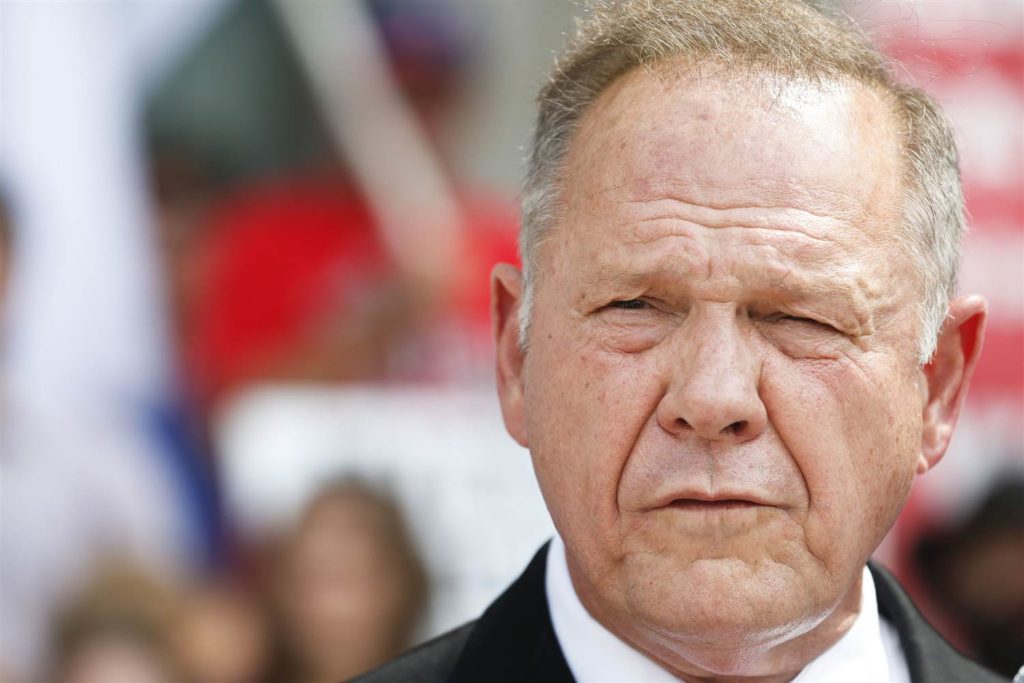
There few no crimes worse than the sexual molestation, exploitation or assault of a child. The mere thought of it makes my blood boil and my stomach turn. Children are the most innocent among us and we have a responsibility to protect them and to hold those who hurt them, in any way, let alone this heinous way accountable. The current atmosphere of empowerment of women to come forward and address their sexual harassers or assailants is one that hopefully will change the world we live in. The #MeToo movement shed light on the prevalence and the secretive nature in which women of all ages, races, economic backgrounds have suffered in silence. From what I can tell, I don’t know a soul who hasn’t been affected either personally or thorough a relationship with a loved one who was a victim of sexual harassment or assault. Think about the reality of that for a moment. It’s disheartening. I’ve been thinking about the movement for days following the explosive accusations against Judge Roy Moore. Here we have accusations involving a woman who claims to have been molested by Moore over 30 years ago. I’m concentrating on the most serious one as I think conflating them with non-sexual accusations were meant to make them more inflammatory. Keep in mind only one woman claimed Moore made sexual advances towards her. When I questioned the timing of the story on my FaceBook page some saw it as a way to defend Moore. It wasn’t. Here is exactly what I said: I’m going to go ahead and say this however unpopular my opinion will be: these 40+ year old accusations against Roy Moore stink to high heaven. This is a man who has been on the ballot before, has made countless national headlines, went through a costly and contested runoff and now one month before general election explosive accusations come forth. I’m not speaking to the accusations or his innocence/guilt I’m just saying it’s highly suspect how this is playing out. How can he even be expected to defend or exonerate himself beyond saying it’s untrue in a way that would satisfy those calling for his head? Since posting that Moore has spoken out emphatically denying knowing or having contact with the alleged victim. Many in Washington have spoken out against him telling him to recuse himself from the race. Mitt Romney tweeted that “innocent until proven guilty is for criminal convictions not elections.” Ultimately that’s what Roy Moore supporters are saying too, “don’t deny us our right to decide at the ballot box.” D.C. made their bet on a candidate early on in this race and they lost. Now there are a lot of people who would see this as their opportunity to right the wrong that voters made when they made Roy Moore their nominee. There has been no trial. There won’t be one. Yet those opposed to Moore, many if not most who never would have supported him in the first place, have used this news story to convict him of the worst crime imaginable. Now they’re pointing fingers at his supporters and telling them get on the bandwagon or you’re as bad as a pedophile. A narrative has begun that if you support Moore you are a condoning the allegations against him. If you question the accusations at all in any way then you’re victim-shaming and are part of the culture that supports sexual abuse and harassment. My concern is that in this case the accusations have become a political weapon not just against Moore, but against conservatives throughout Alabama. The movement for justice, for victims, is being used to deny Moore his ability to defend himself. Should the accusations be found to be true Roy Moore should not be a U.S. Senator. That much should be clear to anyone and everyone. The issue at hand though is that both sides deserve to be heard. I believe more information will be forthcoming. I hope so. In the meantime, voters have put Moore on the ballot in Dec. and voters will decide if they believe he should serve in the U.S. Senate. Mitch McConnell, Mitt Romney and the Washington Post have no vote.
#MeToo: Why it’s past time for men to be men again
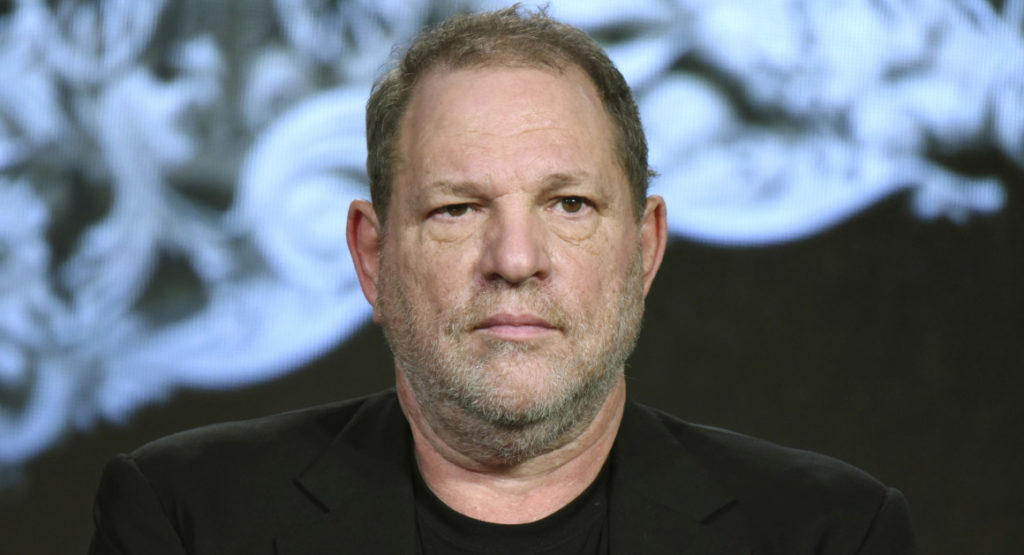
Reality check: Liberal feminism and the idea of gender fluidity is nonsense. Worse, it is ruining our country by disrupting the very roles that make society function well. Men are by nature protectors and providers. They have been from the earliest days of human civilization. Don’t blame the messenger here, but despite what recent generations have told you there are actual differences in the minds and bodies of men and women. Neither are better per se, they are just different. Who or what is responsible for this? Science. Genetics. God. Does that mean that a woman cannot hold her own and take care of herself? As a single mother, I’m responsible for protecting and providing for my children so clearly it’s not an either or proposition. I’m not talking about individual cases I’m talking about society as a whole. We need more men. Real men. Strong men. Courageous men. We are better off as a society when boys/men were taught and encouraged to be strong mentally and physically and to stand up against injustices against women. Yes, I know, I know what you’re thinking the modern feminist movement was all about empowering women to stand up for ourselves. Yes, we can do that too but being able to is not the same as having to. Note: There’s a big difference between the liberal feminist movement and the original. The current feminist movement at it’s core challenges or devalues masculinity and gender norms. These are the feminist that say our boys can’t play with toy guns but they can wear dresses. These are the individuals who love science until science says life begins at conception and that chromosomes determine ones sex. Those feminist want us to believe that allowing someone to decide their gender or heck letting them decide they don’t have a gender at all then providing them safe spaces and trigger warnings can solve our problems. I watched my Facebook feed yesterday as women of all ages, races and backgrounds from around the nation posted “Me, too,” to signal that they had been sexually assaulted or harassed in their lifetime. What struck me was not only the sheer volume of women I know who have experienced trauma in their lifetime but also the reactions of the men who said that they stood with us. I wonder how many men would be committing these atrocious acts against women if more fathers, brothers, boyfriends and males in general took to standing up to them and telling them it wouldn’t be tolerated anymore. I’m talking toe-to-toe in-your-face confrontations. Am I supporting vigilante justice? Well, maybe. In the sense that boys and men can police one another’s behavior and words in school or a fraternity house, on sporting teams or in the office. Imagine if every man took to protecting the women in their midst, treating them with respect and not allowing others any room for get away with anything less than the gold standard. Imagine a world where predators like Harvey Weinstein don’t get second, third or fourth chances. Where those in a position of power don’t turn a blind eye towards their deeds or the gossip about them. Our fathers, our brothers, our husbands are suppose to be ready, willing and able to stand up and go to war, literally and figuratively, to make sure we women and our children are safe. It’s time we women look to them to do so again. Laws, rules and human resources guides aren’t cutting it when it comes to protecting women. Statistics show that. What we need now is real empowerment; not the type that comes on a tee shirt of bumper sticker but women feeling empowered to speak out and men who will have their back when they do. Here’s the thing that gets me about most harassment and the behavior that leads to sexual assault. It can be recognized early on in most men. While we can never predict with 100% certainty who will be a harasser or assailant. We know the type those who don’t respect boundaries, feel as though the rules don’t apply to them and crave attention and power. Remember sexual assault is more about power than sex. Men used to be raised to rise up against injustice not run to safe spaces and cower in the fetal position. Boys used to be taught that they have a responsibility to stand up to the bully, the aggressor, the bad guy. Not always, but frequently there’s tell-tale signs of the guy who says things he shouldn’t, touches women in ways he shouldn’t, acts aggressively and those men need to be shut down with a quickness by the men (and women) around them. A big part of getting us back to where we need to be, is to stop acting like the real world is a gender neutral place. Let’s encourage little boys to rough house, play cops and robbers and line up their GI Joes for war at home and in classrooms. I want boys to play games of saving the damsel in distress and I want girls to know that while they can save themselves it’s okay to need help and to ask for it. It’s okay to trust men. Boys need to develop their intuitive sense of protector without fear of some overzealous liberal saying it poses a threat to their delusional version of Utopia. Teaching a boy to be a man doesn’t mean we don’t teach them that girls are incapable of taking care of themselves, it just means that we teach them that they shouldn’t have to. The fact is all of the victims of Harvey have brothers, fathers, male friends and colleagues. And in a different day and time this wouldn’t have lasted decades because the men around Harvey and his victims would not have allowed it.


